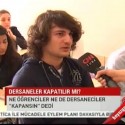Interview to Mr. Cuneyt Ozdemir (CNN Turk)
1) After the Turkish Prime Minister Recep Tayyip Erdogan suggested to closure of all the private tuition centres in Turkey, you have released a statement regarding the infeasibility of such decision, and this was quoted in the Turkish media. Firstly, I would like to ask you what exactly do you know about the way these private tuition centres work in Turkey, and what exactly do you know about the system for entering university in Turkey?
The plan to close dershane in Turkey is a situation contrary to freedom of education. The European Network for Educational Support (European ENES), whose founding member is the Turkish Association TODER, protests strongly about the planned event. The Educational Support is a global educational event that helps children of economically weaker classes to study. Those days, when the afternoon private education is an alternative and modern way to achieve better results for the benefit of the weaker classes, these decisions violate equal opportunities in education.
We know that the Turkish university entering system is fair and chooses the bests objectively.
2) How many of tuition centres in Turkey are the current members of ENES? Does Turkey have the highest number of private tuition centres? And what are the ratios in Europe and in the world?
There are many countries with dershane, much more than in Turkey. I won’t speak for the big Asian countries but for Europe. In Germany, England, France and Portugal there are thousands of evening supporting schools not only for university entering exams but to help the students at their school in every level. Remember that in some European countries such as Germany we have the first steps of support low-income families with voucher system in the education. The necessity of supporting education is fully recognized by the European Union.
3) What do you think of the fact that we (Turkey) are only discussing the product of this situation rather than discussing the university entering system itself, that is reduced down to central exams.
I read at the Turkish press a great argument: “If the garages of cars close, the car accidents won’t be decreased.” Our concern is the education quality and the equal opportunities in every social layer. This practically means creative collaboration of the state and the private initiative in the education.
4) Another widely believed conspiracy in Turkey is that by closing down the tuition centres the government is taking action to prevent the success of the Gulen Movement in private tuition sector. Considering your strong views on this matter, are you any chance a secret member of Gulen Movement?
I have no knowledge of such connection and as far as I know that is not true. And I have nothing to do with the “Gülen Movement” their counterpart in Turkey is “Güvender”. We had and will have no interaction with this organization. We only dealt with the Association of All Private Education Institutions (TODER) in Turkey. TODER is the most organized and dynamic model for supporting education in Europe which the Turkish society trusts and its participation in the European network is very important to us.
5) Let’s say we are not closing down the private tuition centres, then what is your suggestion? Do you think the central exam system in Turkey is humane, or even sustainable?
If we close the dershane, something that happened before from military governments in Turkey, Greece, Korea and Chile, the black market of the educational services will be increased sharply. At the world education we need the exams so that we can choose the bests. If we remove the exams then we will not make champions but illiterates.
George Hagitegas
Teacher of Physics
Director of Greek Dershane (called frontistirio)
Writer of a book about the universal fainomeno of educational support
President of European Network of Educational Support




